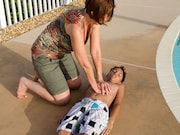BCPR less likely in races/ethnicities other than white
MONDAY, July 15, 2019 (HealthDay News) — For pediatric out-of-hospital cardiac arrest (OHCA), racial and neighborhood characteristics are associated with bystander cardiopulmonary resuscitation (BCPR), according to a study published online July 10 in the Journal of the American Heart Association.
Maryam Y. Naim, M.D., from the University of Pennsylvania Perelman School of Medicine in Philadelphia, and colleagues conducted an analysis of the Cardiac Arrest Registry to Enhance Survival for pediatric nontraumatic OHCAs from 2013 to 2017. For each arrest, an index was created based on neighborhood characteristics associated with low BCPR.
Overall, BPCR occurred in 48 percent of 7,086 OHCAs. The researchers found that BCPR was less likely in other races/ethnicities compared with white children (adjusted odds ratios, 0.59, 0.78, and 0.54 for black, Hispanic, and other). BCPR occurred less often for arrests in neighborhoods with an index score of 1, 2, 3, or 4 compared with 0 (adjusted odds ratios, 0.80, 0.75, 0.52, and 0.46, respectively). With increasing index score, the likelihood of BCPR was incrementally lower for black children, while the likelihood was similar at most scores for white children. Compared with white children with a score of 0, black children with an index score of 4 were about half as likely to receive BCPR.
“Targeted CPR training for low-income, nonwhite majority, low-education neighborhoods may increase BCPR provision and improve OHCA outcomes in children,” the authors write.
Copyright © 2019 HealthDay. All rights reserved.








